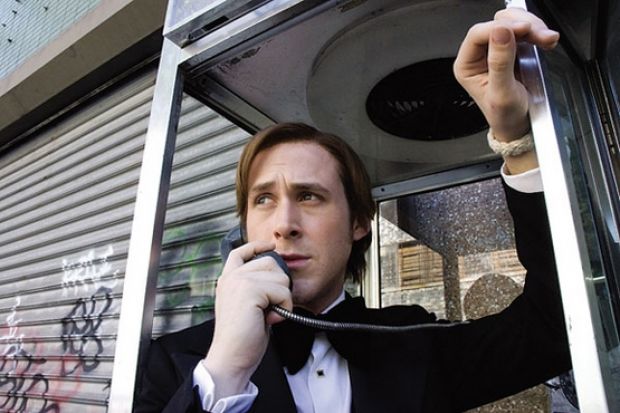All Good Things
Directed by Andrew Jarecki
Released in the US in December 2010
Starring Ryan Gosling, Kirsten Dunst and Frank Langella
"Does that girl know how fucked up you are?" Good question. Not only is Ryan Gosling playing the part of the son of a wealthy New York property developer; he is also a psychopath in love with an innocent, working-class woman. As this film's title suggests, something (or someone) is about to come to a sticky end.
All Good Things is based on the most notorious missing persons case in New York history - that of Kathie Durst (married to Robert Durst, son of a property tycoon) who disappeared mysteriously in 1982, never to be seen again. Her husband's close friend Susan Berman was shot in the head at close range in 2000, and a year later various parts of his neighbour, Morris Black, were found floating in refuse bags in Galveston Bay. An impressive record of mayhem, especially for someone acquitted of Black's murder, and never linked either to the disappearance of his wife or to Berman's execution.
It would be easy for a team of writers to construct a diverting multiplex-pleaser from all this, something to titillate the popcorn-and-Coke crowd for the required 90 minutes; indeed, it has already provided a basis for an episode of the weekly police television procedural, Law & Order. But the makers of this film have been more ambitious.
Within a US context this is a subversive film because it exposes the extent to which the wealthy are capable of manipulating the legal and political system in order (quite literally) to get away with murder. It reveals some fairly unappetising secrets about how things work - things the average US citizen would probably rather not hear, which would explain why it has been the subject of so many unenthusiastic reviews.
From an artistic perspective too, the film makes few concessions to the thriller-seekers; it has a complex narrative structure that interweaves three separate plot strands, demanding of its audience a degree of patience and intellectual engagement to which they may not be used.
Its cleverness owes something to the fact that its director, Andrew Jarecki, comes from the documentary world - something that has done him few favours with reviewers, who accuse him of inexperience with his actors. I see nothing to fault in the film's dramatic qualities, which stand up better than many I've seen this year. Gosling could hardly be bettered in his portrayal of the protagonist. Anyone who saw Stay (2005) will know how elusive he can be, even in a film in which he is central - a quality exploited here. He plays his part with a poker face, letting no one into his head. As the film progresses, it becomes clear this is not a symptom of strength, but of damage. Events in his past have destroyed his ability to empathise with others.
A good deal is demanded of Kirsten Dunst, who charts the journey of Gosling's wife from infatuation to disillusionment, terror and finally depression. She was never presented with such a challenge in Spider-Man 3 (2007), nor any of her previous films - but it is one that she meets without strain.
Frank Langella is one of the best things about this film. In recent years he has cornered the market in the portrayal of self-justifying corruption, ruthlessness and general underhandedness. His face too seems frozen, yet it is a mask concealing dismay at the crimes of which his son is capable. "Your mother was a very sick woman," as spoken by Langella to Gosling, provides one of the film's most chilling moments. Philip Baker Hall, an actor upstaged only by the bags under his eyes, is superb as the veteran soldier who befriends Gosling during his self-imposed exile in Texas.
US reviewers are foxed by the film's invocation of the mannerisms and tics of the Hollywood chiller; it contains echoes of the Hannibal movies, the haunted house and zombie films - but in each case these gestures are a deliberate reminder of the unreality that underpins the expectations in which cinema has coached us. Typical of the film's attitude is a scene in which Gosling looks at his dog and asks, "What are you looking at?", to which the obvious riposte is, "Robert De Niro: Taxi Driver", a line the dog would have spoken in the Disney version. The lesson is that reviewers don't like being teased; they think they're not being taken seriously enough. And that's when they snap.
In the US, newspaper notices of All Good Things carry the admonition, "contains drug use, violence, profanity and sexuality". They could legitimately add "restrained acting, a witty and demanding screenplay, and a refusal to patronise its audience" - which really would be a deterrent. Released outside the mainstream, this film has done poorly in the US and may not achieve the UK release it merits; if so, don't miss it on DVD.
Register to continue
Why register?
- Registration is free and only takes a moment
- Once registered, you can read 3 articles a month
- Sign up for our newsletter
Subscribe
Or subscribe for unlimited access to:
- Unlimited access to news, views, insights & reviews
- Digital editions
- Digital access to THE’s university and college rankings analysis
Already registered or a current subscriber? Login
